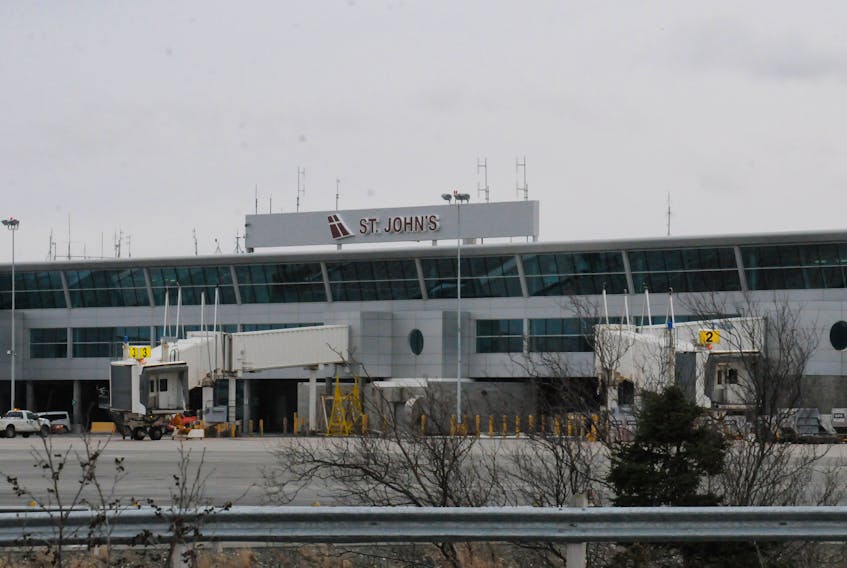ST. JOHN'S, N.L. — “Physical distancing is the one big thing that has helped with slowing the spread of COVID-19,” Chief Medical Officer of Health Dr. Janice Fitzgerald said Monday during the government’s pandemic briefing, when she announced an 18th consecutive day of no new cases of the coronavirus in Newfoundland and Labrador.
Exactly, say lawyers involved in taking the province to court over its COVID-19-related travel ban.
As the province moves closer to a downgraded Alert Level 2 — which could be announced as early as next week — Fitzgerald and Premier Dwight Ball are being peppered with questions from reporters and the public about the controversial travel ban, which denies entry to the province to all but permanent residents of Newfoundland and Labrador, asymptomatic workers and those who have been granted specific exemptions.
The travel ban was implemented last month as part of a special measure order under the Public Health Act in light of the COVID-19 pandemic, and Ball has stressed ever since that the goal is public safety.
Related
- Class action lawsuit filed against Newfoundland and Labrador for its COVID-19 travel ban
- Lawyers challenging Newfoundland and Labrador travel ban want government to show them the science behind COVID-19 decisions
- Change Bill 38, says the Canadian Bar Association – Newfoundland and Labrador
- Newfoundland and Labrador border rules juggle vigilance and compassion
- Police powers expanded to help enforce Newfoundland and Labrador travel ban
“Reconsideration of the ban (will happen) when we can see that Newfoundlanders and Labradorians can actually travel safety,” Ball said during Monday’s briefing.
Health officials have been monitoring the situations in other provinces as well as in the United States, the premier said, and are lifting COVID-19 restrictions slowly in an effort to not trigger a setback.
This province, New Brunswick, P.E.I., Nunavut and Yukon are the only Canadian provinces and territories with travel bans. Last week, the Northwest Territories lifted a similar ban, with government officials saying it conflicted with Canadians’ mobility rights as protected by the Charter of Rights and Freedoms. The decision was inspired partly by two lawsuits that have been filed against the government in this province, alleging the same charter violation.
“Following legal developments in southern Canada, challenging similar actions in Newfoundland and Labrador, we realized we need to take steps to more closely align implementation of our order with the mobility provisions of the Canadian Charter of Rights and Freedoms,” N.W.T. Health Minister Diane Thom said last week.
By law, citizens and permanent residents of the country have the right to move freely, and live and work in any province or territory. Provinces have the authority to limit certain freedoms in outstanding circumstances, such as a public health crisis, within legal limits.
Halifax resident Kim Taylor, a Kilbride native who was denied permission to enter the province to attend her mother’s funeral but was later granted entry, has filed a legal challenge against the Government of Newfoundland and Labrador on the grounds of a charter breach. The Canadian Civil Liberties Association, which has written letters to all provinces and territories stating its opposition to such bans, has joined her in the lawsuit, which will be heard in Newfoundland and Labrador Supreme Court in August.

St. John’s lawyers Geoff Budden and Bob Buckingham have launched a proposed class-action lawsuit against the provincial government on behalf of Canadians from outside Newfoundland and Labrador who own property in the province and are unable to get to it.
Since they launched the case two weeks ago, they have received calls from people looking to join, Budden said.
“We’ve had dozens of people, mostly couples, contact us, so yes, there’s been quite a bit of interest. Every day we’re getting calls and emails.”
These are people who had applied for an exemption to the travel ban and were denied, as well as those who appealed their rejection decision and have not had any response to their request for reconsideration, Budden said.
“We’ve had dozens of people contact us (about joining the class-action lawsuit)... Every day, we’re getting calls and emails.” — Geoff Buddem
“It just goes to the arbitrariness of the process, but if one is to deny what everybody agrees is a charter right, it makes it extremely important, in our opinion, that there be fairness and consistency for all people.”
Between May 4 and June 14, the province approved 6,307 applications for travel ban exemptions and denied 919. There were 187 requests for reconsideration. Anyone entering the province must agree to a 14-day period of self-isolation.
“There’s a small number of people being denied. Most people are getting into the province through that exemption order," Ball said of the applicants.
“The reason most are getting in is that most are applying under one of those exemptions and so we’ve deemed that’s an appropriate way to enter the province,” added Fitzgerald. “We feel that a lot of people who would otherwise have come are not coming because of those restrictions put in place.”
Those who apply to enter the province with an exemption must choose a reason from a drop-down menu on the government’s website. Among the choices are medical reasons, support of a family member in need of care, permanent relocation to Newfoundland and Labrador, student returning from school, a short-term work or school placement, operation of a business in this province, and adoption or shared custody situations.
“It shows there’s a fair bit of movement,” Budden said. “I’m puzzled why our group of clients has been singled out to be denied admission to Newfoundland and Labrador, when they are no more or less infectious, presumably, than these thousands of people are.”
Rosellen Sullivan and John Drover, the lawyers in Taylor’s case, argue it’s the self-isolation and social distancing measures that have had the most impact when it comes to decreasing the COVID-19 cases here, not the travel ban.
Budden agrees.
“Relaxing the travel ban doesn’t mean you need to relax self-isolation and physical distancing or other things that are actually proven preventors of the spread of this terrible disease,” he said.
Twitter: @tara_bradbury









